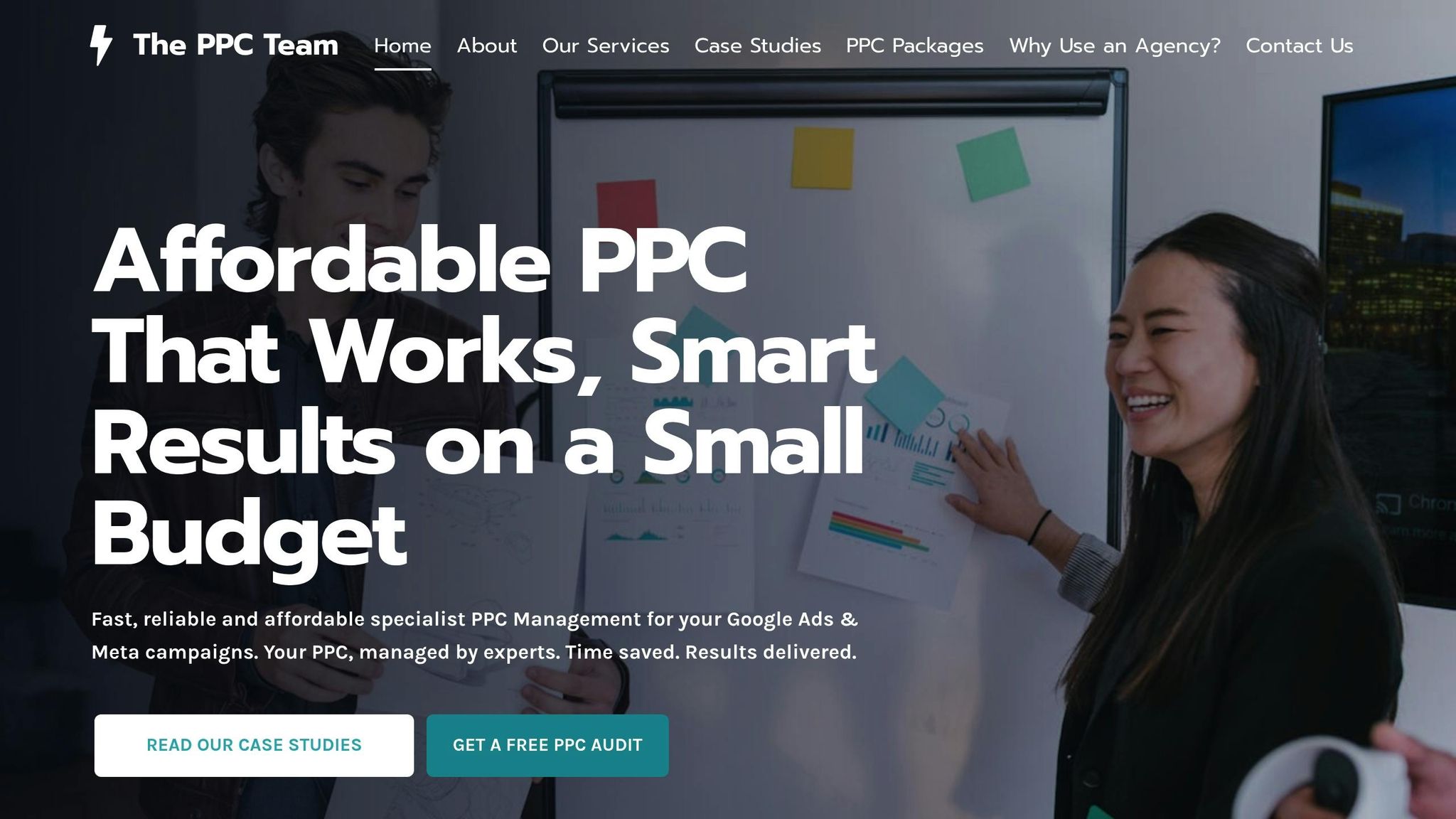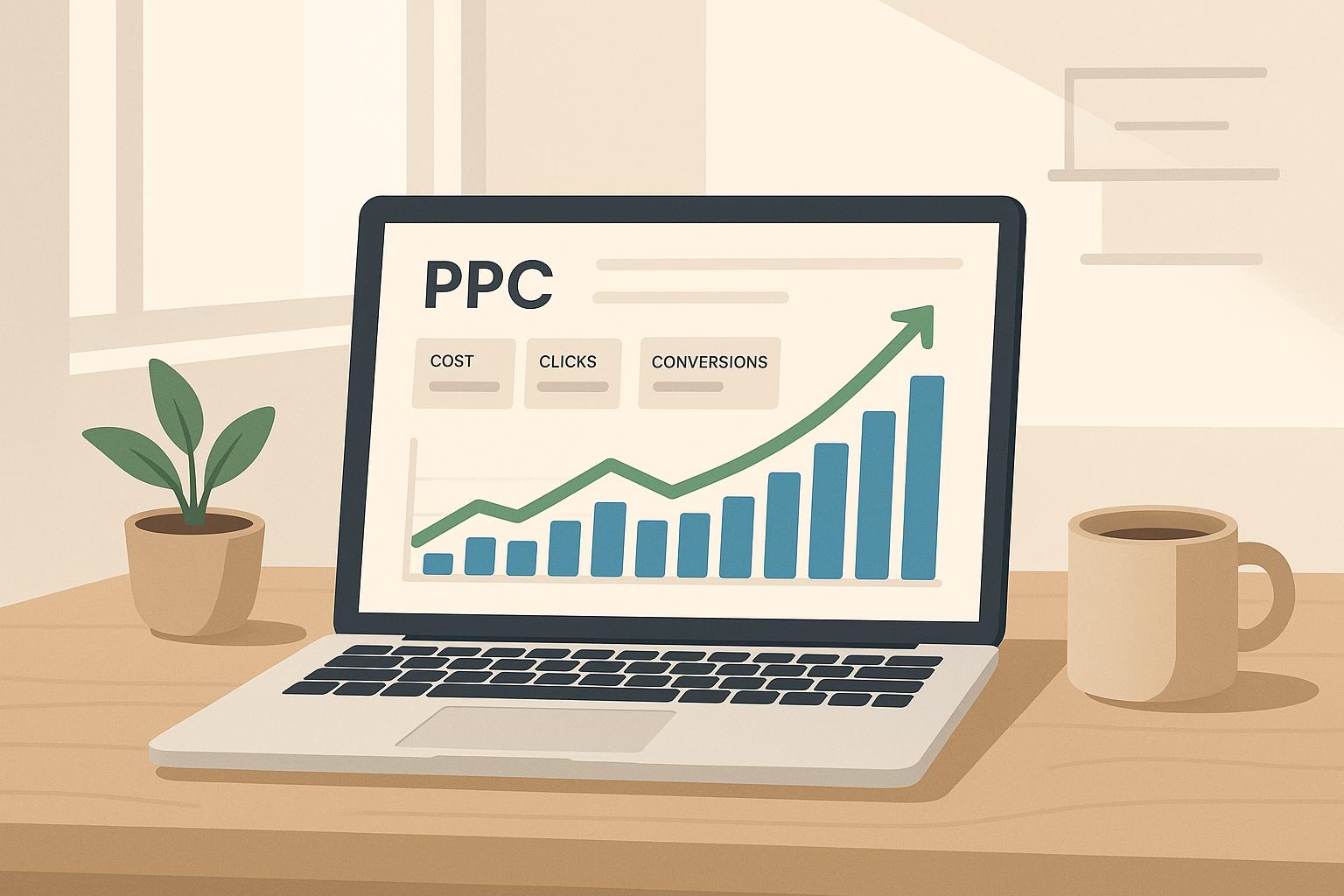Top PPC Services in the UK (And How to Avoid Getting Burned)
Pay-per-click (PPC) advertising can drive immediate, targeted traffic to your website, making it a powerful tool for UK businesses. However, choosing the right PPC service is critical to avoid wasting your budget. Here’s what you need to know:
- The PPC Team offers tailored services for UK businesses with plans starting at £450/month. They focus on ROI, detailed reporting, and local expertise.
- Look for agencies with Google Premier Partner status, transparent pricing, and a strong track record of results.
- Avoid providers that promise instant results, have vague pricing, or lack UK market knowledge.
- Regular audits, clear goals, and careful budget management are key to long-term success.
Quick Tip: Always ensure you have full access to your PPC accounts and request detailed monthly reports to track performance.
This guide explains how to select the best PPC service, avoid common mistakes, and improve your campaigns for better returns.
Running a PPC agency? Avoid these 9 fatal mistakes
Best PPC Services in the UK
The UK has a competitive PPC market, with numerous providers offering proven results. When choosing a service, it’s important to focus on those that deliver measurable outcomes and understand the specific challenges faced by UK businesses.
The best PPC services stand out for their transparent pricing, detailed reporting, and local expertise that aligns with UK regulations. What truly sets the top providers apart is their ability to make every pound of your advertising budget count, driving meaningful conversions. This is especially crucial for smaller businesses working with tighter marketing budgets.
Let’s dive into what The PPC Team brings to the table to help you get the most out of your PPC campaigns.
What The PPC Team Offers

The PPC Team provides affordable, results-oriented PPC management tailored for UK businesses. Their primary goal is to maximise ROI by eliminating waste and ensuring your budget is used as efficiently as possible.
With The PPC Team, you’ll work directly with senior UK-based PPC experts, ensuring faster and more personalised support. Their service kicks off with a free PPC audit, which thoroughly evaluates your current campaign – from conversion tracking to keyword performance – to uncover areas for improvement.
Their pricing is designed with small businesses in mind. The Time & Money Savings Protocol Plan starts at £450 per month (plus VAT) for ad spend up to £1,500. This plan includes conversion tracking setup, weekly optimisations, and monthly performance reports. For businesses with larger budgets, the Growth & Performance Management Plan is available at £795 per month (plus VAT) and covers unlimited campaigns, advanced conversion tracking, and ad spend up to £3,000.
The results speak for themselves. A healthcare brand saw its monthly revenue double within 90 days while reducing its cost per acquisition by 41%. Another client experienced a 63% increase in revenue and a 69% boost in Return on Ad Spend (ROAS) after The PPC Team restructured their campaigns.
"We have really enjoyed working with the team … over the past few months. We have seen a marked improvement in our ROI, and our CPA, which has come down by 46%… we wouldn’t hesitate to recommend them to others looking for support with their PPC."
– Leonard D.
Another client highlighted their cost-saving expertise:
"…they managed to reduce our Google spend by 40% without any loss of sales."
– Suman
Their services cover everything you need for successful PPC campaigns, including campaign setup, keyword research, weekly optimisations, conversion tracking, ad copy refinement, and monthly reporting. For businesses on higher-tier plans, additional features include competitor analysis, demographic targeting, dedicated client managers, and quarterly strategic reviews. This UK-focused approach ensures your investment is protected and avoids common PPC pitfalls.
The PPC Team operates with simple terms, requiring only a minimum 3-month commitment. This flexibility reflects their confidence in delivering quick, measurable results.
How to Choose the Right PPC Agency
Choosing the right PPC agency can be the difference between running campaigns that bring in profits and those that waste your budget. The UK market is crowded with agencies making big promises, but only a handful truly deliver results that justify your investment. To separate genuine expertise from flashy marketing, focus on agencies with a proven track record, clear communication, and a deep understanding of the needs of UK businesses.
Check Their Track Record and Skills
Look for official platform partnerships. Agencies with Google Premier Partner status are among the top 3% of providers, judged on factors like client retention, growth, and ad spend. This status gives them access to Google’s latest features, beta programmes, and dedicated support teams. Similarly, the Meta Business Partner badge signals expertise in social media advertising.
Industry recognition matters. Awards from organisations like the European Paid Media Awards or European Search Awards show that an agency’s work has been independently reviewed and deemed outstanding.
Examine their case studies. A reliable agency should provide case studies with clear data, timelines, and client details. Look for examples relevant to your business size or sector. For instance, while a healthcare success story might not directly apply to e-commerce, it demonstrates the agency’s ability to adapt strategies.
Strong data analysis is crucial. Top agencies excel at using tools like Google Analytics and Search Console to gather and interpret data. They combine hard metrics with qualitative insights to continuously refine campaigns.
Test their expertise during consultations. Ask specific questions about keyword research, bid management, and conversion tracking. They should also be able to explain complex topics like Google Shopping product feed optimisation and audience targeting in simple terms.
Clear Reporting and Communication
Once you’ve assessed their skills, it’s essential to evaluate how they report and communicate.
Expect detailed monthly reports. These should break down metrics like CPA, ROAS, and conversion rates in a way that’s easy to understand. Reports should also include actionable insights that explain what these numbers mean for your business.
Communication should be regular and proactive. Good agencies keep you updated on campaign performance, market trends, and optimisation opportunities. They don’t wait for scheduled check-ins to flag issues or suggest improvements.
Transparency is non-negotiable. Avoid agencies that are vague about their fees or unwilling to explain their methods. You should always know what you’re paying for and how success is measured.
Quick response times are a must. If an agency is slow to respond during the initial stages, it’s a red flag for how they might handle communication once you’re a client.
Custom Strategies and UK Compliance
After ensuring clear communication, check if the agency tailors strategies to the UK market.
Generic strategies don’t work. A good agency will create campaigns designed specifically for your business goals, audience, and market conditions. They should ask detailed questions about your customers, competitors, and growth plans before recommending a strategy.
UK advertising regulations require expertise. The Advertising Standards Authority enforces strict rules on digital advertising, particularly regarding claims, pricing, and targeting. Your agency must understand these regulations and ensure all campaigns comply with UK standards.
Local market knowledge gives an edge. Agencies that understand UK consumer behaviour, seasonal trends, and regional differences can optimise campaigns more effectively. This includes knowing peak shopping periods, local events, and cultural factors that influence buying decisions.
Conversion rate optimisation adds value. A great agency doesn’t just drive traffic – they help convert visitors into customers. This involves improving landing pages, enhancing user experience, and running systematic A/B tests.
Commitment to continuous improvement is key. The best agencies regularly review performance, test new strategies, and adapt to market changes. Staying up to date with platform updates and industry shifts is vital for long-term success.
sbb-itb-dcae4ad
Mistakes to Avoid When Hiring a PPC Provider
Many UK businesses make errors when selecting a PPC provider, often due to rushed decisions or being swayed by flashy promises. These mistakes typically arise from focusing on style over substance. Building on the criteria we’ve discussed earlier, here are some specific pitfalls to watch out for when hiring a PPC agency. Recognising these warning signs can help you make a better-informed choice.
Warning Signs to Look Out For
Beware of agencies promising instant results or overnight success. PPC campaigns take time to optimise and deliver meaningful outcomes. If an agency guarantees immediate rankings, they either lack a proper understanding of digital advertising or are misleading you.
Watch for vague pricing during negotiations. Unclear quotes often hide extra charges for setup, reporting, or campaign changes. Some agencies may lure you in with low monthly fees but surprise you later with add-ons. Always request a detailed cost breakdown upfront.
Refusal to provide account access is a major red flag. Your PPC accounts are your business assets, and you should have full administrative access. Agencies that withhold access may be concealing poor performance or trying to tie you to their services.
Aggressive sales tactics are another warning sign. Agencies that push hard for a quick commitment often prioritise closing deals over delivering results. A professional agency will give you time to evaluate your options and answer your questions thoroughly.
Undisclosed outsourcing to overseas teams can lead to communication issues and lower campaign quality. Ensure you know who’s managing your campaigns and whether they understand UK-specific market conditions and regulations.
Lack of focus on testing or optimisation is a problem. PPC isn’t a “set it and forget it” service. Successful campaigns require constant monitoring, A/B testing, and adjustments to improve performance over time.
Agency Comparison Table
Use this table to systematically compare potential agencies and spot any red flags:
| Evaluation Factor | Red Flag | Good Sign | Excellent Sign |
|---|---|---|---|
| Pricing Transparency | Hidden fees, vague quotes | Clear monthly rates | Detailed cost breakdown with no hidden charges |
| Account Access | No access provided | Limited access | Full admin access from the start |
| Reporting Frequency | Only monthly reports | Bi-weekly updates | Weekly reports with real-time dashboard access |
| Strategy Customisation | Generic, one-size-fits-all | Some industry-specific tailoring | Fully bespoke strategy tailored to your business |
| Communication Style | Slow or jargon-heavy responses | Professional, timely responses | Proactive updates in plain, easy-to-understand language |
| Track Record | No case studies shared | Generalised success stories | Detailed, relevant case studies with supporting data |
| Contract Terms | Long-term lock-ins | 3-6 month minimum contracts | Monthly rolling contracts |
Pay close attention to contract lengths. Avoid agencies that demand a 12-month commitment upfront. Reputable providers often offer shorter initial contracts, giving you the flexibility to continue based on performance.
Be wary of agencies setting unrealistic timelines. While you may see some early improvements, meaningful results and optimisation usually take 2-3 months to materialise.
Lastly, an agency’s poor online presence should raise concerns. If they struggle to market themselves effectively, it’s fair to question their ability to promote your business successfully.
Getting Better Returns from PPC Campaigns
Getting the most out of your PPC campaigns involves more than just setting up ads and hoping for the best. The real difference between campaigns that deliver strong results and those that waste money often lies in how well you plan, monitor, and fine-tune your strategy.
Set Clear Goals and Monitor Progress
Start by defining specific, measurable goals that align with your business priorities. Vague objectives like "increasing website traffic" won’t cut it. Instead, aim for metrics like "reducing cost per lead" or "improving return on ad spend (ROAS)." These benchmarks give you a clear way to measure success.
Tracking key performance indicators (KPIs) is non-negotiable. Metrics such as conversion rates, ROAS, and cost per lead provide the data you need to evaluate performance. Make sure you set up accurate conversion tracking from the beginning – this ensures you’re making decisions based on solid data, not guesswork.
PPC campaigns can change fast, so it’s a good idea to review performance weekly. Regular check-ins allow you to identify trends early and make timely adjustments. Once your goals and metrics are in place, audits can help identify areas that need attention.
Use Free PPC Audits to Your Advantage
Free PPC audits can be a goldmine of insights into how your campaigns are performing and where they might be falling short. For example, the PPC Team offers detailed audits that assess your account structure, keyword choices, and ad copy.
These audits can uncover issues like irrelevant keywords or underperforming ad copy that might be dragging your campaigns down. Armed with this information, you can focus on the changes that will have the biggest impact on your results.
Scheduling audits regularly – such as every quarter – can help keep your campaigns competitive and aligned with market trends. These insights are essential for staying on top of your budget and ensuring your efforts remain efficient.
Fine-Tune Budgets and Campaigns
Managing your budget effectively is key to improving your PPC performance. Keep a close eye on your spending, especially when launching new campaigns, to avoid any unpleasant surprises. Reallocate funds to campaigns and keywords that are delivering better results.
Dayparting is another powerful tool. By scheduling your ads to run during the times when your audience is most likely to engage – for instance, business hours on weekdays – you can improve cost efficiency and get more value from your spend.
If a keyword consistently fails to meet your cost-per-acquisition target, don’t hesitate to pause it. Redirect that budget to elements of your campaign that are performing well.
When you’re ready to scale a campaign that’s working, do it gradually. Increasing budgets too quickly can disrupt performance, so take a cautious approach to maintain stability and ensure continued success.
Building Long-Term PPC Success
Creating a successful PPC strategy that stands the test of time isn’t about quick fixes – it’s about making smart decisions from the outset and committing to constant improvement. Be cautious of agencies that make lofty promises or rely on one-size-fits-all methods. These are often red flags for providers focused on short-term gains rather than sustainable growth.
To achieve consistent results, you need to go beyond short-term wins and embrace a mindset of continuous strategy refinement. Effective PPC campaigns are built on ROI-focused strategies that evolve alongside your business. This means setting clear, measurable goals, keeping track of the right performance metrics, and using data to guide your decisions. Regular reviews and thoughtful budget adjustments are key to staying competitive and ensuring your campaigns remain cost-effective.
Consistency is the cornerstone of long-term PPC success. Businesses that achieve the best results treat PPC as an ongoing investment rather than a one-off task. This involves conducting regular audits, adapting to market shifts, and scaling successful campaigns gradually to maintain steady performance. These practices align perfectly with the tactical adjustments and routine evaluations mentioned earlier.
As you refine your PPC tactics, it’s essential to view them as part of a larger marketing strategy. Integrating PPC with your overall digital marketing efforts ensures it delivers lasting impact. The agencies that provide enduring value are those that understand how PPC aligns with your business goals and can adjust their strategies as your company grows and market conditions evolve.
FAQs
What should I look for in a trustworthy PPC agency in the UK?
A trustworthy PPC agency in the UK will prioritise delivering measurable outcomes while consistently fine-tuning campaigns for better performance. They’ll closely monitor key metrics like click-through rate (CTR), conversion rate (CVR), and cost-per-click (CPC) to ensure your campaigns yield a strong return on investment (£). You should also expect regular updates and clear, transparent reports to keep you informed about how things are progressing.
Beyond monitoring metrics, a reliable agency will stay ahead of market trends by experimenting with new strategies and continuously improving their approach. Choose a team that aligns with your business objectives and takes an active role in helping you achieve them.
How can I make sure my PPC campaigns follow UK advertising rules?
To keep your PPC campaigns in line with UK advertising regulations, it’s crucial to adhere to the rules set by the Advertising Standards Authority (ASA) and the Committee of Advertising Practice (CAP). This means steering clear of misleading claims, ensuring your ads are socially responsible, and making it clear when content is promotional rather than editorial.
On top of that, make sure you’re following data protection laws like the GDPR when working with personal information – especially if you’re using it for targeted advertising. It’s a good idea to stay updated on changes to UK advertising and privacy laws, and consulting with professionals can help you ensure your campaigns remain legally sound. By prioritising transparency and ethical practices, you’ll not only avoid fines but also build trust with your audience.
How can I optimise my PPC budget to get better results?
To get the most out of your PPC budget in the UK, start by honing in on long-tail keywords. These more specific search terms often attract users who are closer to making a decision. Pair this with negative keywords to block irrelevant traffic, cutting down on wasted clicks and improving your return on investment.
Set clear and measurable goals for your campaigns from the outset. Regularly dive into performance data to see what’s delivering results. Experiment with different ad variations, tweak your bids based on performance, and refine your audience targeting to make sure your ads land in front of the right people. Adding localised landing pages tailored specifically for UK customers can also make a noticeable difference in your conversion rates.
Don’t let low-performing keywords drain your resources – identify and remove them to free up your budget for better-performing areas. By consistently monitoring your campaigns and making small, strategic adjustments, you can stretch your PPC spend further and achieve better results.

